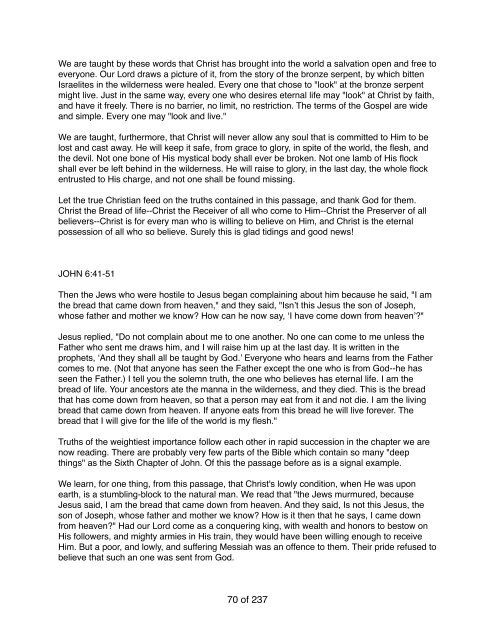J. C. Ryle John
John Charles Ryle (May 10, 1816 - June 10, 1900) was an evangelical Anglican clergyman and first Bishop of Liverpool. He was renowned for his powerful preaching and extensive tracts.
John Charles Ryle (May 10, 1816 - June 10, 1900) was an evangelical Anglican clergyman and first Bishop of Liverpool. He was renowned for his powerful preaching and extensive tracts.
Create successful ePaper yourself
Turn your PDF publications into a flip-book with our unique Google optimized e-Paper software.
We are taught by these words that Christ has brought into the world a salvation open and free to<br />
everyone. Our Lord draws a picture of it, from the story of the bronze serpent, by which bitten<br />
Israelites in the wilderness were healed. Every one that chose to "look" at the bronze serpent<br />
might live. Just in the same way, every one who desires eternal life may "look" at Christ by faith,<br />
and have it freely. There is no barrier, no limit, no restriction. The terms of the Gospel are wide<br />
and simple. Every one may "look and live."<br />
We are taught, furthermore, that Christ will never allow any soul that is committed to Him to be<br />
lost and cast away. He will keep it safe, from grace to glory, in spite of the world, the flesh, and<br />
the devil. Not one bone of His mystical body shall ever be broken. Not one lamb of His flock<br />
shall ever be left behind in the wilderness. He will raise to glory, in the last day, the whole flock<br />
entrusted to His charge, and not one shall be found missing.<br />
Let the true Christian feed on the truths contained in this passage, and thank God for them.<br />
Christ the Bread of life--Christ the Receiver of all who come to Him--Christ the Preserver of all<br />
believers--Christ is for every man who is willing to believe on Him, and Christ is the eternal<br />
possession of all who so believe. Surely this is glad tidings and good news!<br />
JOHN 6:41-51<br />
Then the Jews who were hostile to Jesus began complaining about him because he said, "I am<br />
the bread that came down from heaven," and they said, "Isn’t this Jesus the son of Joseph,<br />
whose father and mother we know? How can he now say, ‘I have come down from heaven’?"<br />
Jesus replied, "Do not complain about me to one another. No one can come to me unless the<br />
Father who sent me draws him, and I will raise him up at the last day. It is written in the<br />
prophets, ‘And they shall all be taught by God.’ Everyone who hears and learns from the Father<br />
comes to me. (Not that anyone has seen the Father except the one who is from God--he has<br />
seen the Father.) I tell you the solemn truth, the one who believes has eternal life. I am the<br />
bread of life. Your ancestors ate the manna in the wilderness, and they died. This is the bread<br />
that has come down from heaven, so that a person may eat from it and not die. I am the living<br />
bread that came down from heaven. If anyone eats from this bread he will live forever. The<br />
bread that I will give for the life of the world is my flesh."<br />
Truths of the weightiest importance follow each other in rapid succession in the chapter we are<br />
now reading. There are probably very few parts of the Bible which contain so many "deep<br />
things" as the Sixth Chapter of <strong>John</strong>. Of this the passage before as is a signal example.<br />
We learn, for one thing, from this passage, that Christ's lowly condition, when He was upon<br />
earth, is a stumbling-block to the natural man. We read that "the Jews murmured, because<br />
Jesus said, I am the bread that came down from heaven. And they said, Is not this Jesus, the<br />
son of Joseph, whose father and mother we know? How is it then that he says, I came down<br />
from heaven?" Had our Lord come as a conquering king, with wealth and honors to bestow on<br />
His followers, and mighty armies in His train, they would have been willing enough to receive<br />
Him. But a poor, and lowly, and suffering Messiah was an offence to them. Their pride refused to<br />
believe that such an one was sent from God.<br />
70 of 237




